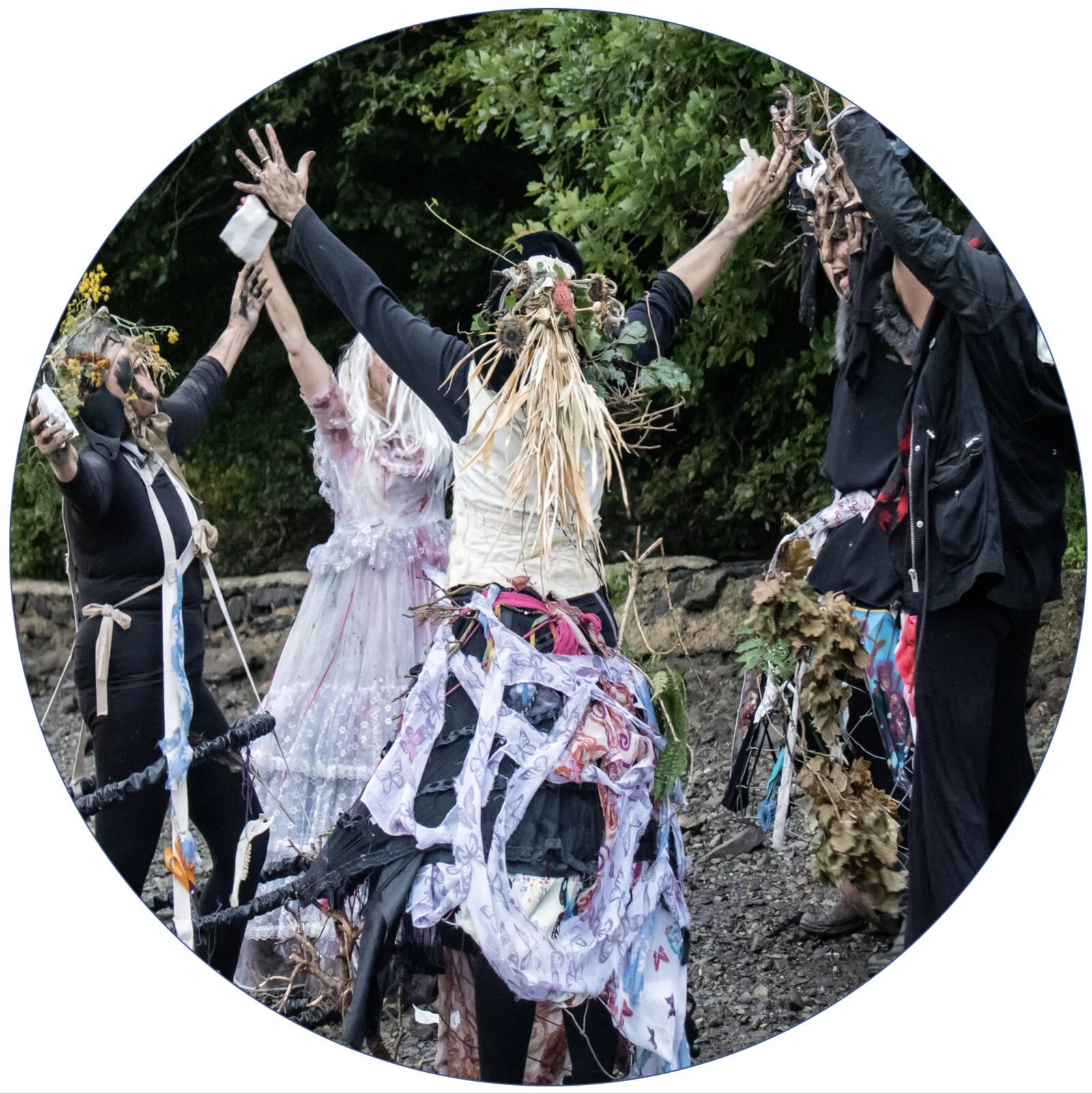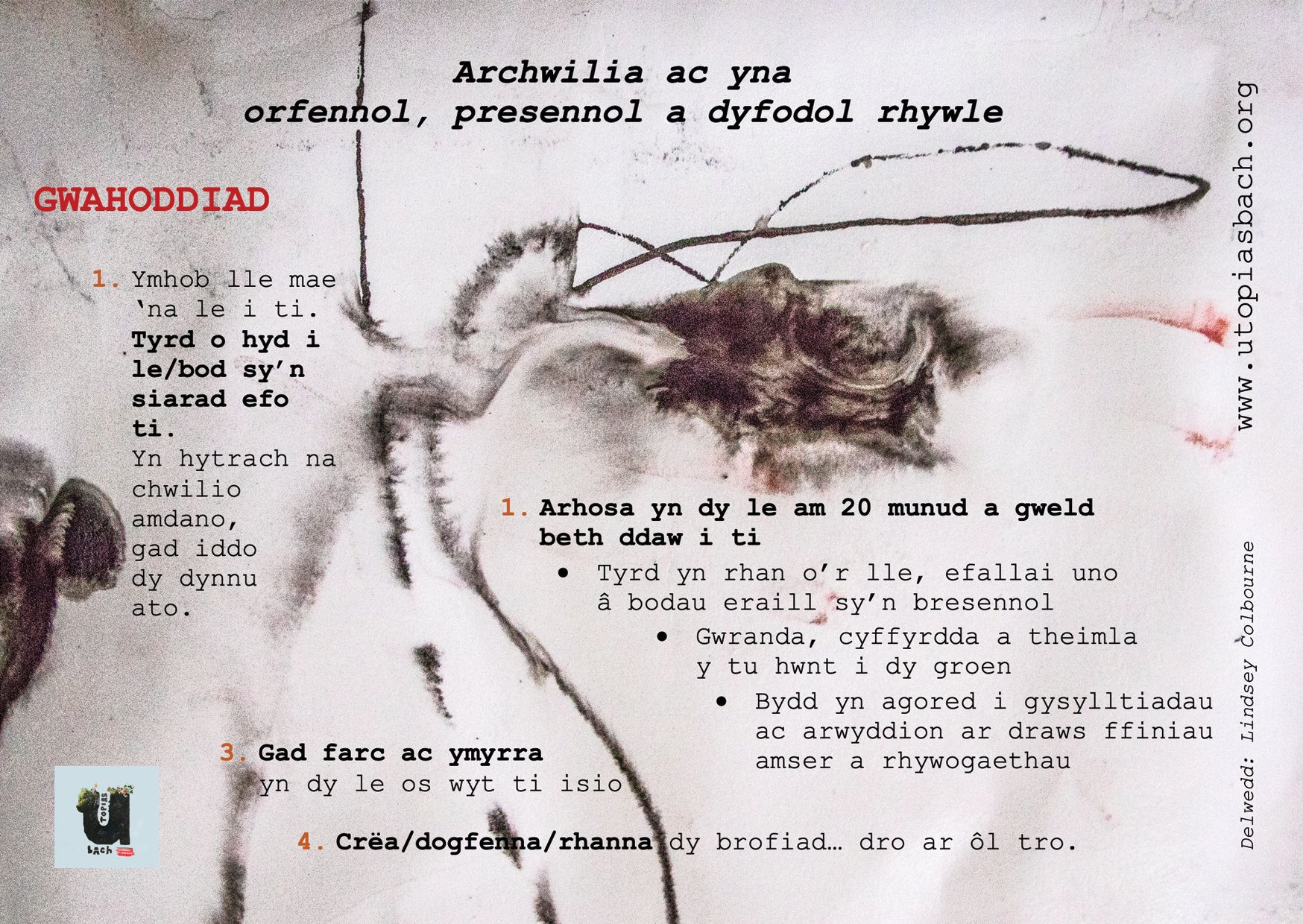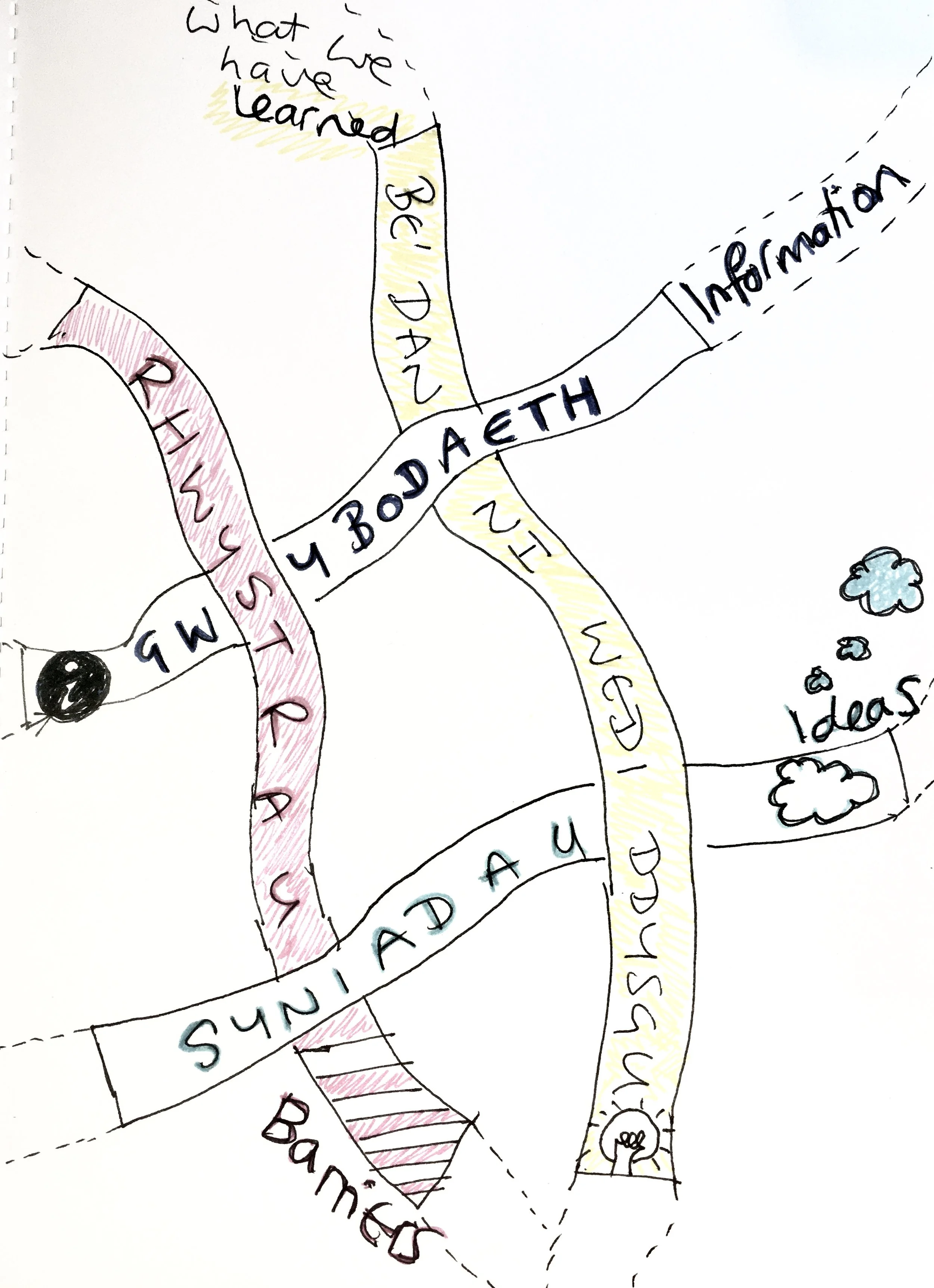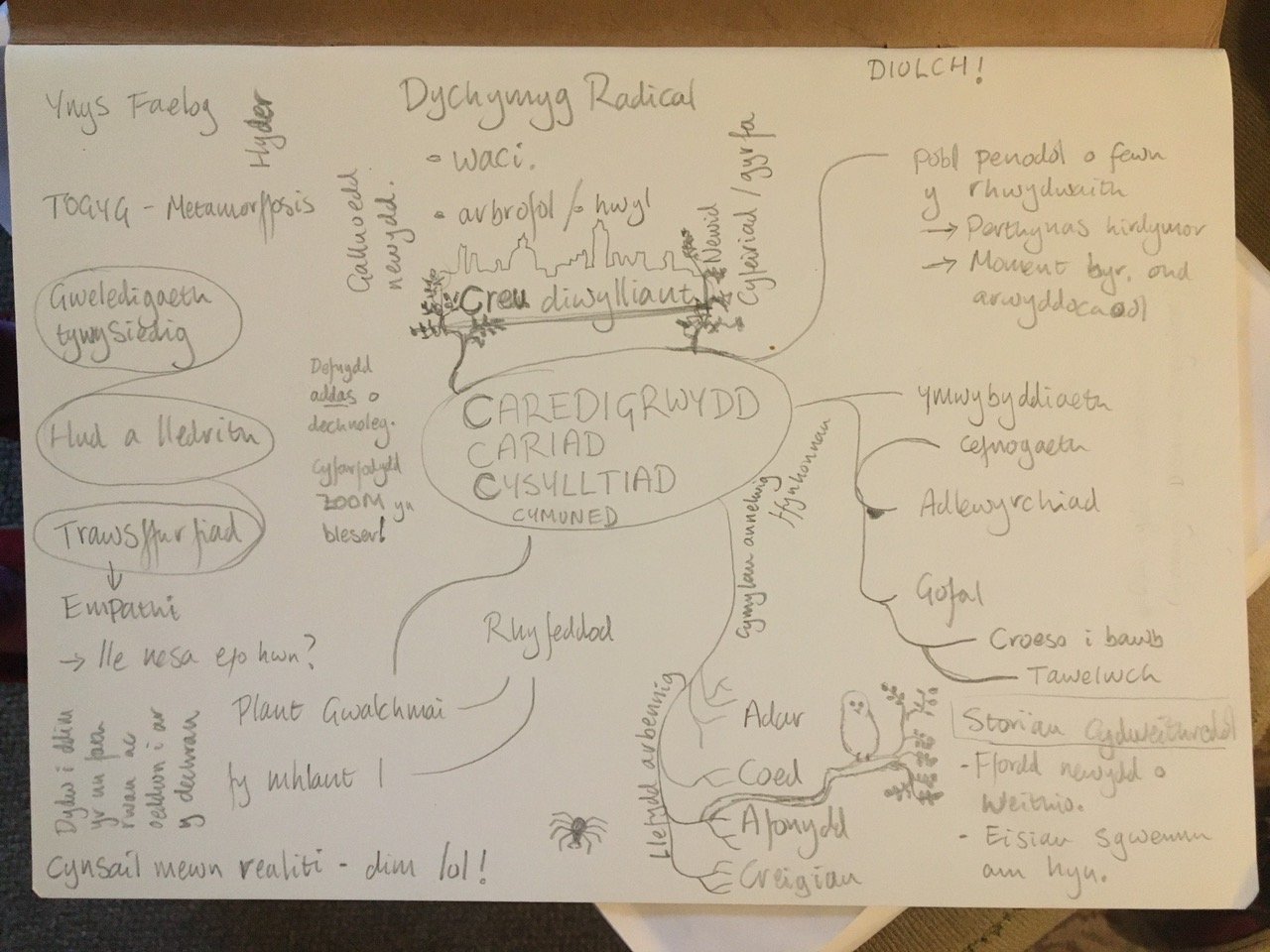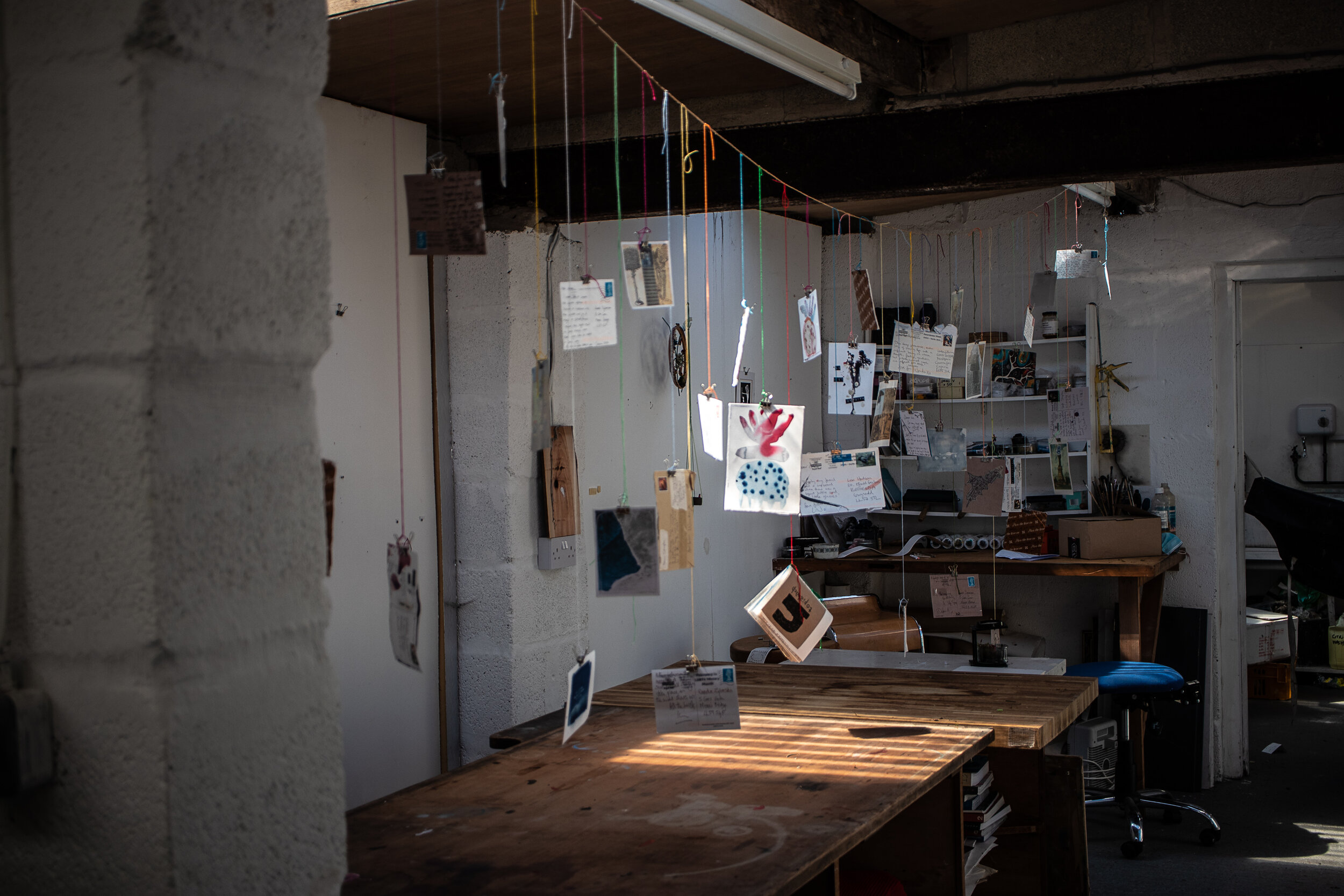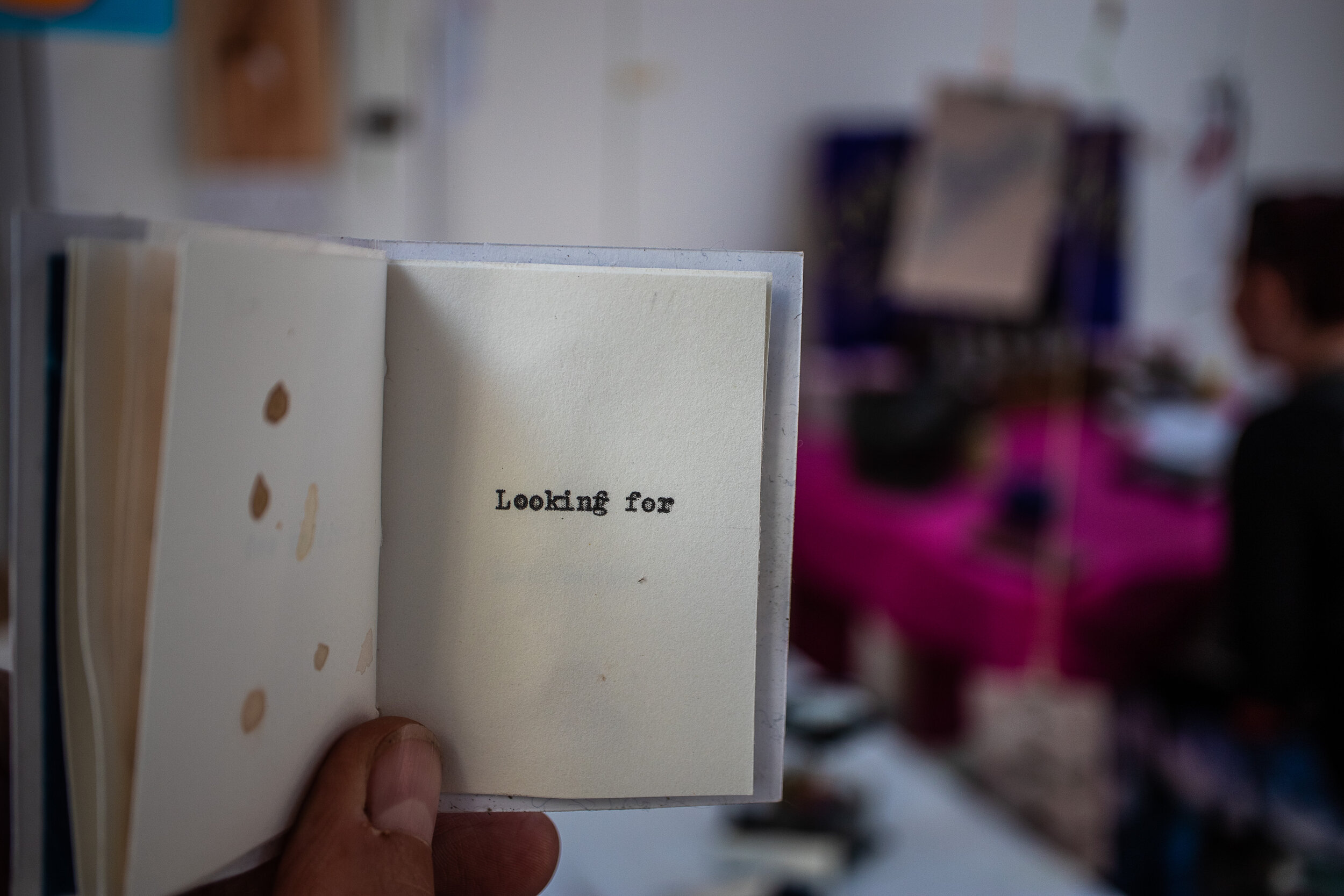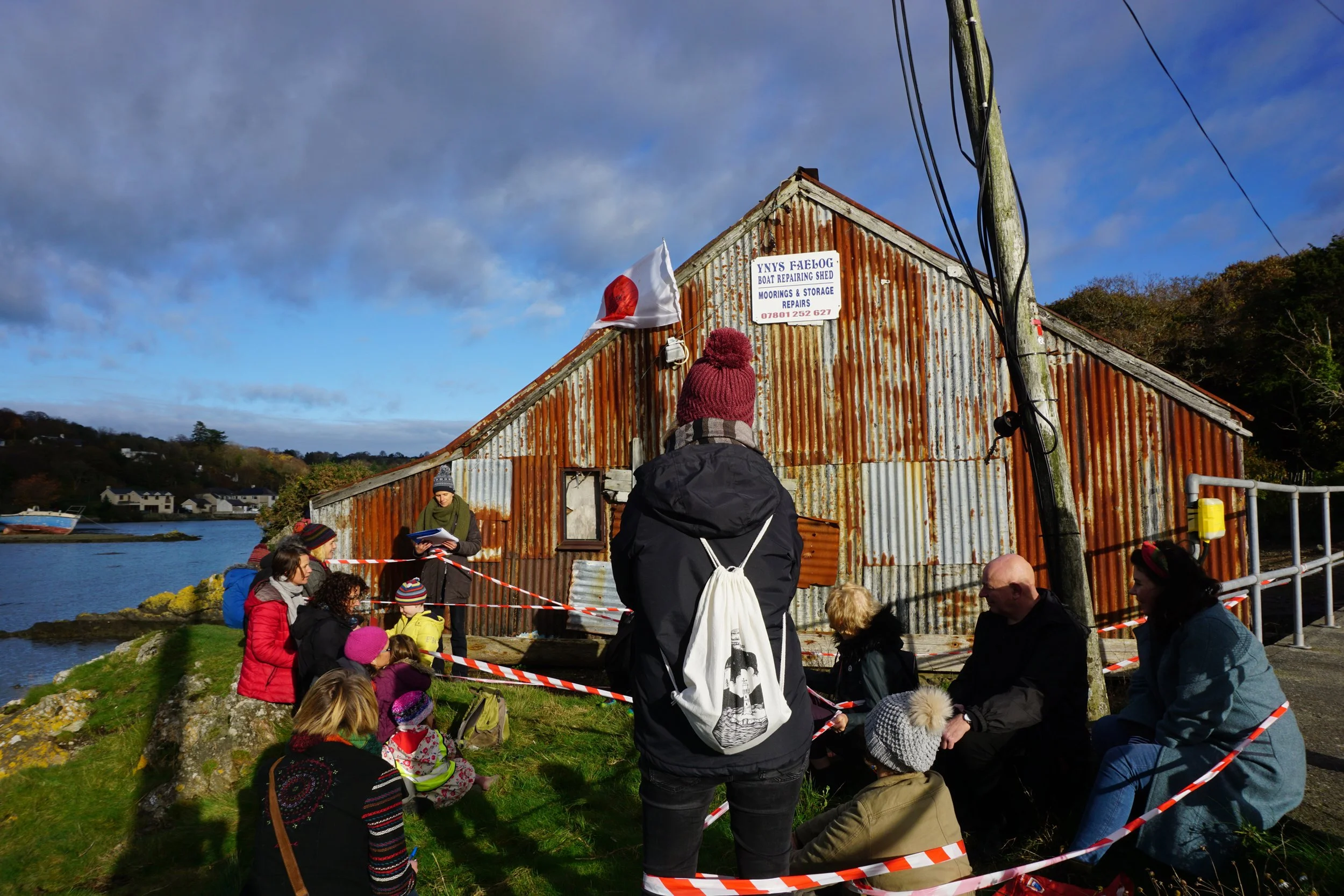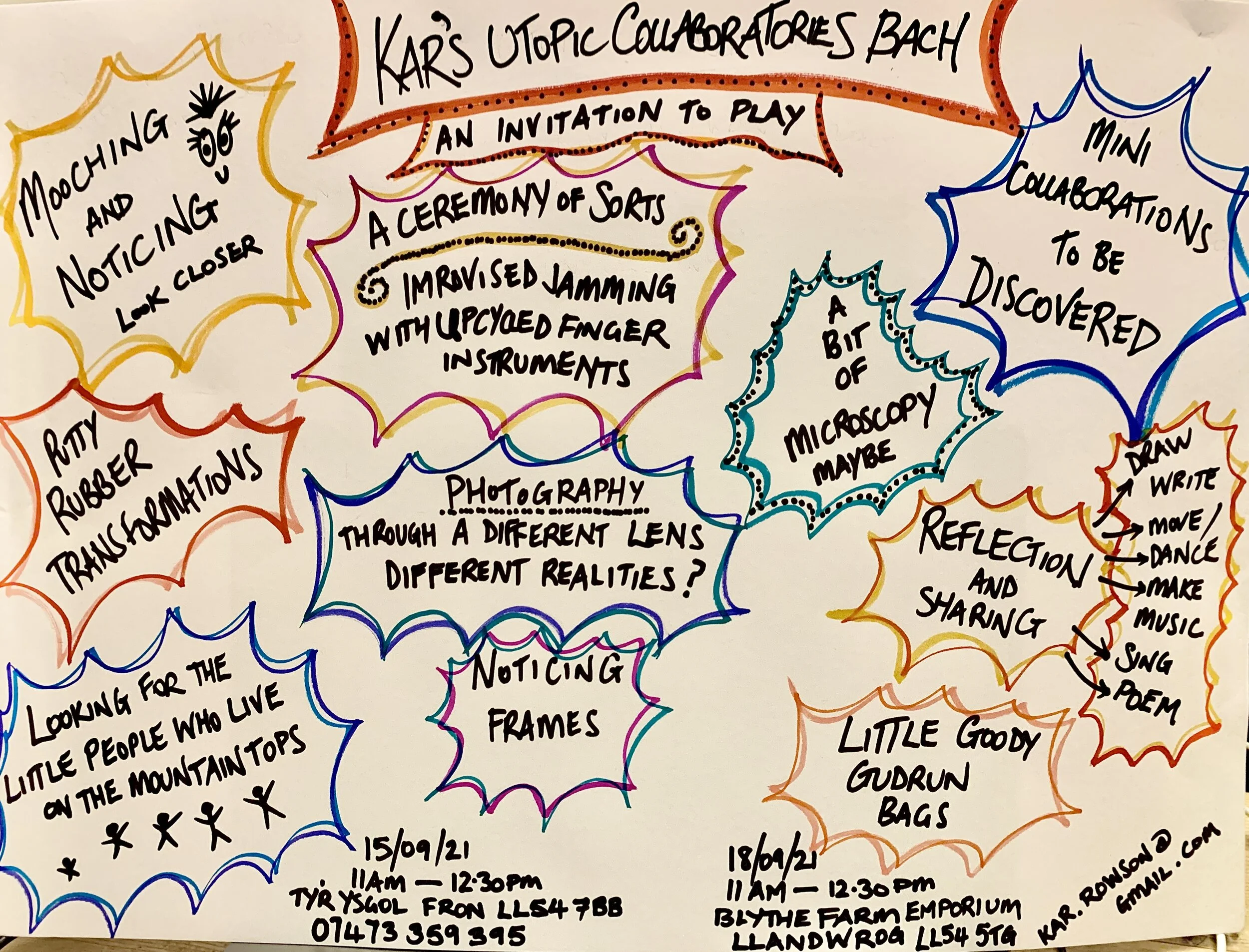
Collaboratory Utopias Bach
be’ dan ni’n wneud / what we do
aelodau / members
cyfarfodydd / meetings
dogfennu / documentation
dysgu / learning
“a modest example of a venue where these reimaginings weave themselves together (which doesn’t mean they all agree!) and one that resonates, in some small way, with the future we are going to create together”
Max Haiven and Alex Khasnabish
Collaboratory Fferm Henbant Farm efo Samina Ali: 23.4.22
Mae Cymuned Utopias Bach yn gymuned amrywiol, ddwyieithog ac yn dysgu trwy weithredoedd yn agored i bawb sydd gan ddiddordeb mewn Utopias Bach.
Dan ni’n artistiaid, ‘gysylltyddion cymuned’, academiaid, awduron a siaradwyr gwadd, o Gymru a’r byd, sy’n gweithio efo’i gilydd i gynhyrchu syniadau, cefnogi ‘arbrofion’ a datblygu diwylliant o ddatblygu personol a phroffesiynol wrth rannu sgiliau a gwybodaeth mewn ymarferion celf cydweithredol, yn gweithio efo cymunedau a gweithio ar raddfa fach gyda dychymyg radical.
Dan ni’n chwilio am gwestiynau yn hytach nag atebion, neu o leiaf byddwn yn ceisio osgoi canlyniadau anhyblyg.
Dan ni’n ystyried ein hunain i fod yn datblygu diwylliant ar raddfa fach fel un o’n cynigion tuag at Utopia Bach. Byddwn yn gweithio gyda’n gilydd gyda gofal a pharch tuag at ein gilydd a phawb fydd yn cymeryd rhan, gan dalu sylw at broses, dulliau a’n datblygiad ni’n hunain yn yr arbrawf hwn.
The Utopias Bach Collaboratory is a diverse, bilingual, action-learning community open to all who are interested in Utopias Bach.
We are artists, ‘community connectors’, academics, writers and invited speakers, from Wales and internationally, who work together to generate ideas, support ‘experiments’ and develop a culture of personal and professional development by sharing skills and knowledge in co-created art practice, working with communities and working at small scale with radical imagination.
We seek questions rather than answers, or at least we will avoid rigid conclusions.
We consider ourselves to be developing a miniature culture as one of our attempts towards a Utopia Bach. We will work with care and respect to each other and all who take part, paying attention to our process, methods and our own becoming in this experiment.
Dogfennu & Dysgu Documenting & Learning
We are committed to finding ways to document and learn together without it all getting overwhelming!
We’ve started a padlet of resources and insights and activities as a timeline, and have started compiling ‘aspirations’ or principles and questions for Utopias Bach:
We have identified three types of documentation:
Thread, flow, intent (eg see our padlet)
Material for a purpose (eg to share learning on something)
Individual moments of insight/significance (postcard exchange)
We recognise that not everything can be ‘captured’, and want to avoid an overwhelming body of documentation.
We are approaching documentation as an art in itself, so for example, postcards from our postcard exchange might be brought together to create an exhibition. We are also working with meeting recordings, doing blogs and sharing sources of ideas and inspirations in our library.
In 2023 we started working on our Cwilt Utopias Bach quilt as a way of embodying our principles and ways of working, experimenting with ‘non-paper based policies’ in partnership with Rewilding the Artist.
We are always interested in any responses/ documentation you might wish to share, so if you have any documentation ideas please get in touch. More details here
See below for documentation experiments.
Beth dan ni’n neud
What we do
We are currently working on:
1. Trying out making your own Utopia Bach, in whatever form, as a way of building examples and learning about the potential of Utopias Bach. You can see the results of our early experiments shown at Geocache Bach, as part of Metamorffosis, June 2021
2. We are sharing ideas for and progress of ‘community based’ experiments, each one going at its own pace, and some just remaining as ideas…
3. In 2024 we will be 4 years old! We are developing Utopias Bach as a whole. See here for how we are (always) rethinking what Utopias Bach might be, how it might work etc.
Aelodau / Members
The Collabatory is open to all! Those attending include:
Lindsey Colbourne, Samina Ali, Lisa Hudson, Wanda Zyborska, Seran Dolma, Roger Hughes, Perminder Dhillon, Catrin Ellis, Julie Upmeyer, Frances Williams, Steph Shipley, Maggie Doherty, Mark Gahan, Iain Biggs, Audrey West, Debbie Braden, Andrew de Salis, Llinos Griffin, Wendy Dawson, Lynsey Smith, Lee Green, Sarah Pogoda, Siân Shakespear, Elinor Gwyn, Emily Meilleur, Sarah Holyfield, Patsy Moffett, Wanda Garner, Gruff Ellis, Paul Haswell, Nicole le Maire, Huw Jones, Lana Feldmann, Marian Brosschot, Gaia Redgrave, David Cleary, Katie Trent, Irene Gonzalez, Cat Lewis, Emma-Jayne Holmes, Mair Jones, Emily Wilkinson, Sian Hutchinson, Julia Wilson, El Davies, Lal Davies, Roxy Plaza, Sioned Huws, Sarah Louise-Wheeler, Ed Straw, Femke Gent, Sian Hutchinson, Fiona Fraser-Smith, Verity Williams, Arwel Jones, Sian Elen, Nina Othen, Marged Pendrell, Les Johannes, Elen Pennant, Karine Decorne, Tryne Moore, Mary Thomas, Myfanwy Jones, Peter Hughes, Lucy Finchett-Maddock, Jeff Morgan, Odette Baber, Craig Stewart, David Garner, Siân Cwpwr, Carys Anne Hughes, Julia Wilson, Charlotte Elvin, Dani Abulhawa.
Os hoffech chi dderbyn gwahoddiadau i’n cyfarfodydd, os gwelwch yn dda llenwch y ffurflen isod:
If you’d like to receive invitations to our meetings please fill in the form below:
PLEASE NOTE: to also receive the Utopias Bach newsletter, please subscribe using the form at the bottom of the page!
Cyfarfodydd/digwyddiadau
Meetings/events
We meet once a month (on two different days) over zoom and/or physical meetings as/when that is possible. Each meeting is hosted by a different person. Sometimes we just meet to share where we are at, sometimes we focus on one person’s work, sometimes we’ll have a guest ‘speaker’ or maybe we’ll go on visits etc. If you would like to ‘host’ a collaboratory meeting, or introduce a topic or question or share your work, we’d love to hear from you! lindsey.colbourne@me.com
You are welcome to attend a meeting to see if you enjoy it - no commitment needed!
Our meeting process
Learning how to work together is one of the things we do in UB. We try to:
1. Start with clear purpose (often an enquiry or question)
2. Build learning about the process of the meetings into the meeting - e.g. at the start, ask what we need to remember from last meeting; in the middle review how it’s going (e.g. in smaller groups); at the end review how it has been
3. Introduce some suggestions for how to take part effectively
minimizing distractions – sudden movements, sounds etc. [Park Bench/Park Warden]
notice how much talking you are doing (or not doing)
build in space to think – comfortable with silence; one person speaks at a time; grounding/creative exercises
take time out – quiet garden
engage with curiosity about others’ views
contributions in languages other than English welcome
4.Agree if/how to record.
“There’s no other choice but to deploy an art of conversation between worlds”
- The Invisible Committee
Gwahoddiadau - Invitations
The Utopias Bach Collaboratory has been developing invitations and scores as a way of structuring our events and activities. We’d used these with formal arts establishments and Universities as well as within our own meetings. These have included:
Ail Ddychmygu’r Oriel - Reimagine the Gallery
Maniffesto o Le - Manifesto of Place
Trawsffurfiad - shape shifting
See also Sgôr Poged - Scores
We also have a page where members of Utopias Bach post their invitations to others to join them in experiments, activities and so on. See here
Gwahoddiadau Utopias Bach Invitations, an exhibition at Galeri, Caernarfon (June - 5 July 2023) brings together some of these invitations and responses to them.
Beyond policy
September 2023, our Collaboratory focused on exploring how we might embody our Utopias Bach evolving ‘feel, experience, invitation, system, policies, etiquette, cultures’ rather than having a dry set of ‘fixed’ paper-based policies and descriptions. The result was the idea of a radical kind of Quilt, created in community together/at home…
This Collaboratory was run in partnership with Gaia Redgrave’s Rewilding the Artist project.
See also safeguarding/culture of care
Beyond funding
The Collaboratory is the place where Utopias Bach makes decisions and ‘plans’. You can watch how we discussed what to do after our Arts Council funded year (2021-22), and how this has developed by going to our Be’ Nesa? What Next? page
Meeting Recordings
“Utopias Bach and Socially Engaged Art - where’s the art and is it any good (and does it matter)?” with Wanda Zyborska. Here is a recording of our Collaboratory on 26.1.22.
The first part includes the introduction, meditation, Wanda’s presentation and discussion.
The second is the last half hour of discussion
If you would like to just see Wanda’s presentation, you can download it here or read this blog Wanda has written about it
The Blueprint of Peace Explored Through Ma / online (Zoom) with Gaia Redgrave
Wednesday 11th May 2022 11am - 12.30pm
This is a recording of Gaia’s Collaboratory which is part of her Cathedral of the Trees experiment. Gaia led us through an exploration, providing time for individual creative response that will make use of the imaginary, the physical and the liminal space in between the two (the Ma) and encompassing the seen and unseen, encouraging us to consider the concept of what peace could be, where it resides, and how it can be made manifest.
- Introduction to the session and the Cathedral of the Trees
- Checking in through an embodied warm up with Samina and an exercise to connect with the land
- Exploration of our individual ‘earth songs'
- Creating a collective earth song.
Collaboratory Utopias Bach: New Welsh Art, Avant Garde, Afon Gad Utopias Bach + Avant Quilt!
Efo/With Sarah Pogoda
28.12.23 11.00-13.00
A recording of ‘hybrid (zoom-room) discussions led by Sarah around an idea (quickly transmuted) and the need/form for a new book, exploring the Avant Garde, New Welsh Art, the Afon Gad and links to Utopias Bach … an interesting discussion of language, afon gad and socially/environmentally engaged practices, the role of documentation, little books and transforming the mainstream. During this discussion we were also working on our Cwilt Utopias Bach Quilt
Reflective Learning frameworks
Cyfarfod Collaboratory Meeting 23.3.222: Beyond Evaluation - the Elephant’s ears and tail: Designing a Utopias Bach approach to evaluation, with our Participant Observer, Frances Williams. Her presentation starts at about 11 mins in, but for the full experience (recommended!) we have kept the whole meeting recording, with zoom chat added alongside the video and audio recording. You can also download Frances’ presentation here
Person Centred Co-Creation
Framework by Lisa Hudson, head of reflective practice at Utopias Bach
Weaving framework for the Collaboratory by Lindsey Colbourne
The Utopias Bach Methodologies toolkit
Using the Utopias Bach greenhouse toolkit to review Geocache Bach by Lisa Hudson
Co-creation Reflection
Composite made from the exquisite corpses
Lisa Hudson led our December 2021 Collaboratory meeting as a reflection on our journey so far. One method she introduced was ‘what would Utopias Bach be as a creature?’
Our session over zoom included creating a collaborative poem of our journey:
“Time and talking, in community
A web of warm-hearted people
Otherness branching, flowering fruit
Community picnic on the gwastadnant - cliffs coming?
Creative notion, expansive nature, comfort of friendliness
Playful. Discombobulating. Irregular.
Illusive, cyclical, a firm foundation
Melting pot of luscious ideas.
Riding on an elephant, with views all around high
I’ve found my tribe. Kindness. Innovation. Anarchy
A great sea makes in here.”
Mapping experiments
Inefficient Mapping of Collaboratory meetings by Lisa Hudson
Counter-Mapping at Geocache Bach June 2021
Collaboratory 16.3.22
Mapping Moments
How do we connect through Utopias Bach?
My relationship with Utopias Bach by Irene Gonzalez. Marach 2022
Frances Williams, our Participant Observer/Observant Participant invites you to create a map of your connection to Utopias Bach. The map here was produced by Irene. But feel free to do it your way… we leave that open to you.
We hope to gather examples from week to week as part of our ongoing search to go ‘beyond evaluation’ (see video/pdf in the Reflective Learning Frameworks section above).
Looking forward to interpreting them together to better understand how we connect, when and how. Get as detailed, abstract, creative as you like.
Map gan Lindsey Colbourne
Map gan Llinos Griffin
Map gan Seran Dolma
Mapping Moments by Kar Rowson
Postcard Exchange
We have started sending each other postcards to ‘capture’ individual moments of insight/significance. This is an example of trying to approach documentation as an art in itself, and for example, our postcards are occasionally brought together to create an exhibition.
Eglurhad anelglur gan Seran Dolma
Reflections on the postcard exchange by Julie Upmeyer
See also our Deconstructed Conference page
Cerdyn post Collaboratory Utopias Bach: Bysedd Llechi gan Lindsey Colbourne
Postcard by Iain Biggs
Arddangosfa Postcard Exchange - TOGYG, June 2021 (Geocache Bach)
Sound documentation experiments
(Try these with headphones if you have them)
Self-documentation
Peaceful Play event (collaboratory 14.5.22) by Gaia Redgrave
As part of Gaia’s Cathedral of the Trees experiment, Gaia invited us to play, to our wildest imagination and embrace peace through play. We were asked to document the process / the outcome (in anyway we choose) and share on social media (especially Instagram) using the following hashtags.
#cathedralofthetrees #utopiasbach #peace #gaiaredgrave #play #conversationswithtrees #nature
Gaia also welcomed photos and short films to be sent to the email address below so that we can re-post them to The Cathedral of the Trees Instagram page.
See the results here: The Instagram Page
Llun gan Nina Othen, efo Jim ac Emmalayla
Collaborative writing and blogs
Combining words, images, sound from various people. Led by Seran Dolma, Awdur Preswyl
Straeon Byrion Cydweithredol Utopias Bach Collaborative Short Stories: Stori Aderyn Du, A Blackbird’s Story; Stori Sycamorwydden, A Sycamore’s story
Ynys Faelog, Stad o Feddwl Ynys Faelog, State of Mind collaboratory hosted by Sarah Pogoda, November 2021
Manifestos for the future
Our November 2022 collaboratory was held in collaboration with the Being Human Festival. We explored how human and more-than-human people can break through to new relationships with place, and how to create a maniffesto of place - see the results here
Video documentation experiments
Collaboratory 14.4.21: Cut up documentation experiment: 1.5 hours into 2.5 minutes. Lindsey Colbourne
Patsy Moffett
Conversation overlaps merges in and out of focus like the visuals. Kar’s Collaboratory Sept 2021
Utopias Bach Collaboratory 21.11.21, hosted by Sarah Pogoda. Video by Steph Shipley
Ynys Oes Oesoedd by Steph Shipley (Collaboratory 26.4.22)
Collaborative minute-making experiments
Page one of the minutes of our first real world Collaboratory meeting, as part of Geocache Bach. Read the full minutes/contribute here (scroll along the timeline to the right to find them!)
Collaborative hosting
Starting in September 2021, each of our Collaboratories is hosted by a different person. If you would like to ‘host’ a collaboratory meeting, or suggest a location or a topic, we’d love to hear from you! lindsey.colbourne@me.com
We have also started working with other groups and organisations to collaboratively host our Collaboratories. These have included Oriel Brondanw, Oriel Mostyn and Hwb Bangor (Being Human Festival, Bangor University)
Kar’s Utopic Collaboratories Bach 15 & 18.9.21. Hosted by Kar Rowson.
Documentation: Dan ni’n arbrofi efo ‘Miro Board’ - see this Miro Board as an experimental way of capturing the results of our experimental photography/words/video etc.
Patsy Moffett
Flickering the light through a tear in the card to highlight a raised part of the rock intermittently.
Creative responses to zoom
Zoom Exquisite Corps - Wanda Zyborska
Initially all our activities took place on Zoom, so I explored the composition and aesthetics of Zoom, and experimented with different visual possibilities, such as setting up exquisite corpses composed between screens. At the end of a meeting when there were only three of us left on screen, we made exquisite corpses, working out how we could line up the screens one above the other to make the three separate spaces that equate to the folded paper (and make up the disconnected/reconnected body parts) appear the same in each of our screens:
We have made a few of these now. The exquisite corpse is a Surrealist visual tool that we frequently utilise in Utopias Bach in different media to try and free our imaginations. Another visual intervention on Zoom is using the various video filters, as Sarah Pogoda is doing in the top frame of the exquisite corpse in figure 2. Her more usual choice of filter was a mouse's nose and whiskers. We also tried various backgrounds that can overlap the individual's body, and the margins are another medium for visual play
The Mondrian-like rectangular divisions of Zoom are each a separate moving portrait. I found myself watching myself at the same time as talking to others. How much we can see of each body (head only? torso? top of head?), and what of the varied, usually domestic, backgrounds, including occasional pets, children and other family members? I began performing inside my border, making shapes and breaking up the edges with my arms, moving or being still, trying to get my legs into the frame. Others joined in. When someone was sad we all spread our arms and tried to make visual a group hug.
Sound - El Davies (Keeper of Sounds)
Taking inspiration from the connection of isolated individuals via Zoom during Covid I will explore this musically using the concept of the zoom screen comprising many individual squares making up a combined whole group on the screen. Each individual within each square will have their own leitmotif (a memorable musical catchphase) created from the rhythms, actions and even their own name - unique to them. I aim to transcribe these musically through a variety of compositional techniques such as cryptography, morse code, 12 note magic squares and serialism… I will bring all these individual parts- all these unique musical catchphrases- together to create a whole new exciting piece of music, unique in itself.
Throughout the piece will be a retuning memorable motif created out of the name UTOPIUS BACH as a reminder that the sum is more than the individual parts while honouring the individual cogs and recognising that, just as the main plant on a strawberry brings everything together, they (we) are all connected.
Top to bottom: Sarah Pogoda, Wanda Zyborska and Lisa Hudson (2022) Zoom Exquisite Corpse, screen shot.
El Davies - Magic Squares


